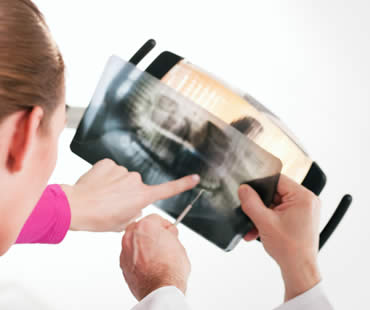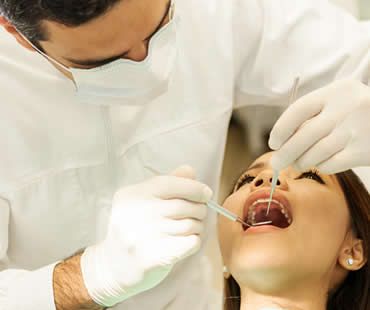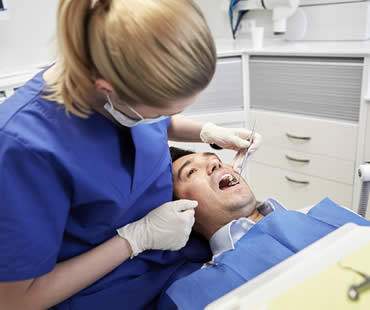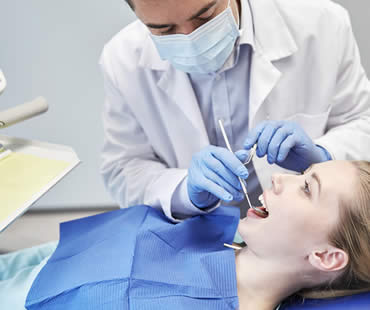
Wisdom teeth are the third set of molars, and usually emerge in the late teens or early twenties. Standard dental practice is to remove wisdom teeth prior to them being fully formed when the roots have not yet had a chance to develop and fully root into the jaw. Younger patients usually have an easier recovery from surgery and many dentists believe early removal prevents future dental problems associated with wisdom teeth.
If your wisdom teeth were not removed as they emerged, there are some signs and symptoms that would indicate the need for extraction including:
- Wisdom teeth that are impacted, which means they have become trapped in the jawbone or gums.
- Wisdom teeth that are emerging at an awkward angle, causing pressure on adjacent teeth.
- Wisdom teeth that do not fit in your mouth, causing crowding of the surrounding teeth as well.
- Wisdom teeth that are suffering from decay or disease caused by the inability to keep them cleaned properly.
- Wisdom teeth that have developed fluid-filled cysts near the gumline.
- Wisdom teeth that are causing pain due to any of the above reasons.
The decision about whether or not to remove your wisdom teeth should be made in consultation with your dental professional. Your dentist or oral surgeon can assess the position and health of your wisdom teeth and make a recommendation for treatment.
If extraction is recommended, they may choose to extract one tooth or all four molars at once. Recovery from the outpatient procedure takes just a few days, and you will quickly be back to normal. Consult with your dental professional if you are experiencing any of these symptoms listed to determine if you should consider wisdom tooth removal to ensure your future good oral health.
We treat patients from Toronto and the surrounding area

Wisdom teeth are really just your third molars, located in the very back of your tooth arch and are the last of your adult teeth to erupt. They most commonly erupt between the ages of 17 and 20. Most people have them, but for some people, these third molars simply do not develop. Some patients might have more than one set of wisdom teeth! Only an x-ray can reveal the complete story.
A high number of patients who possess wisdom teeth don’t know they have them because the teeth are impacted, or stuck underneath already erupted teeth, as opposed to erupting normally through the gums. This is when wisdom teeth become problematic.
The patient’s jaw may be too small to allow for the full eruption of the wisdom tooth, leading to it becoming stuck in the jaw, pushing at other teeth, causing pain and shifting of the teeth. The tooth might be able to erupt partially, triggering a flap of gum tissue to develop over the tooth, trapping bacteria and germs which can lead to serious infection.
Sometimes wisdom teeth come in at strange angles, facing sideways or backward, or they develop a serious infection and damage the surrounding teeth. They can also lead to the development of a cyst or cause damage to the jawbone.
If your dentist has told you that you need to have your wisdom teeth out, it’s a good idea to listen and to follow that advice. Removing problematic wisdom teeth can reduce crowding in the mouth, infection in the gums or tooth decay in the wisdom tooth or in the surrounding teeth.
The younger you are when you have your wisdom teeth removed, the easier it is to recover. Ask your dentist to learn more about wisdom teeth and about your particular needs as a patient.
If you need a dentist in Toronto contact us today

If your teen is scheduled to have wisdom teeth extraction surgery, you might be feeling stressed-out about the procedure and how you can best prepare for what’s to come. Surgery can be frightening. As the adult, it’s your role to get the information you need and to educate and calm your teen so that you both have a feeling of confidence and safety during all steps of the oral surgery.
Don’t mislead your teen about the procedure or recovery time. Talk about the reasons the wisdom teeth need to be extracted; be honest about the issues. Talk about the oral surgeon and his or her qualifications and why this particular surgeon was chosen. Help give your teen a sense of trust in the surgeon, to help calm his or her nerves.
Listen to everything your child has to say regarding the surgery. Validate all your child’s feelings and statements and offer any guidance you can from your own life’s experiences. Be open to allowing a conversation between the surgeon and your teen. Your oral surgeon has experience in dealing with fearful patients and can often remedy fearful thoughts and feelings more efficiently than a parent.
Reassure your child that you won’t be far away during or after the procedure. Even though your teen may be already in college, surgical procedures can be frightening and you might be surprised at how much your teen may lean on you, emotionally and physically during this time.
Answer any of your child’s questions honestly. Go over any parts of the surgery that are confusing to your teen. This knowledge can restore a sense of control to the patient, and allow the patient to feel prepared to recover.
Your teen’s oral maxillofacial surgeon wants your teen to be comfortable during the surgery. Sedation dentistry options may be offered as early as the night before, so that the patient can be well-rested and calm for the procedure.
If you need a dentist in Toronto contact us today

It is estimated that ten million impacted wisdom teeth are removed every year. This means that you or someone you know has probably experienced this type of oral surgery. Even so, the thought of wisdom tooth extraction strikes fear and apprehension in many people. Knowing more about why it’s necessary and the procedure itself may alleviate your concerns.
Wisdom teeth are the furthest teeth in the back of your mouth, and come in later than all of your other teeth. Sometimes they don’t erupt at all, becoming stuck or impacted in your gums. Even if they do come in naturally, they may not fit in your mouth properly with the rest of your teeth.
There are some common issues that necessitate the removal of wisdom teeth. These include:
- Impaction – impacted teeth may grow sideways and even damage your jawbone.
- Infection – teeth that partially erupt can cause openings in your gums that allow bacteria inside, causing sometimes serious infections.
- Tumors and cysts – complications like tumors and cysts can develop around impacted wisdom teeth, sometimes damaging to the gums and jaw.
- Pressure – impacted teeth can pressure the surrounding teeth, causing abnormal growth, tooth decay, and orthodontic problems.
The best way to avoid these types of issues is to have your wisdom teeth surgically removed. Many dentists recommend removing them even before you’re experiencing problems, so that you avoid problems later. Your dentist may refer you to an oral surgeon. After a consultation and examination including X-rays, a treatment plan will be determined.
Wisdom tooth extraction is an outpatient procedure in the surgeon’s office, using some level of anesthesia. Sometimes only local anesthesia is required, while some cases benefit from deeper levels of anesthesia for your comfort and health. Afterwards, you will experience some discomfort and should follow the doctor’s advice for care. Ice, pain medications, a soft diet, and rest are advised. A follow-up visit will be scheduled to monitor your healing. Typically, you will be back to normal in a few days and won’t have to worry about your wisdom teeth again.
Schedule your appointment at our Toronto dental office

Wisdom teeth are the last adult teeth to erupt into the mouth, generally emerging between the ages of seventeen and twenty-one. They are the third set of molars and are in pairs: two each on the top and bottom arch of teeth. While some patients don’t have wisdom teeth, most do. Many of those who do have them don’t have enough room for those teeth to erupt fully, causing them to be wedged under the back of another tooth, impacted in the gum.
Impacted wisdom teeth are very difficult to clean, and can negatively affect the surrounding teeth. They are highly vulnerable to disease and decay and may lead to tooth pain and damage to adjacent teeth. For these and other reasons, a dentist may recommend that the teeth be extracted through oral surgery as soon as necessary to prevent any problems.
If you live in the Toronto area contact us today

If you didn’t have your wisdom teeth out as a young person, you may be wondering about having them out as an adult. Your dentist may have recommended that you prevent future infections, cysts or pain in the jaw due to wisdom teeth that are growing under other teeth – known as impacted teeth. Even a type of tumor has been linked to impacted wisdom teeth.
Impacted teeth result when the wisdom tooth grows up under an existing tooth. Sometimes, adults have wisdom teeth that come in completely straight behind back molars. In rare cases, one or more of these teeth don’t grow at all. An x-ray can reveal the presence of the teeth. Impacted teeth cause problems with existing teeth and must come out.
Because the roots of wisdom teeth typically fully develop near the age of 24, removing them after this time can be more complicated. Roots can entwine with facial nerves, making extraction problematic. It’s recommended that adults receive a CT scan of their jaw, showing the clear positioning of facial nerves and roots, something not shown by x-rays. If the roots of the lower wisdom teeth aren’t touching or wrapped around the alveolar nerve, extraction is still possible.
Adults with wisdom teeth are at higher risk for gum disease. Gum disease has been linked to an increase of pregnancy complication and other health issues. Previously believed only to affect patients in their late 30s, this gum disease is now being shown to affect much younger patients, especially young pregnant women. Growing evidence is also connecting gum disease to inflammation due to chronic infections in the body, leading to an increased risk of diabetes and heart disease.
Talk to your dentist today to see if you should have your wisdom teeth removed. Be honest about any symptoms you’re having, such as pain or pressure, and let the professional evaluate your specific situation.
Schedule your appointment at our Toronto dental office







 E-Mail Us
E-Mail Us  416-595-5490
416-595-5490








